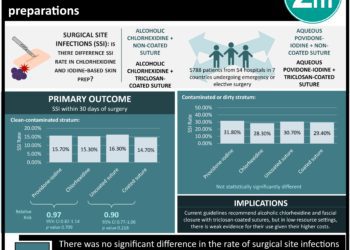Restricting perioperative fluid for abdominal surgery patients does not reduce complications: The RELIEF trial
1. Among patients at increased risk for complications undergoing abdominal surgery, those randomized to perioperative fluid restriction did not have increased disability-free survival at one year compared to patients who received liberal perioperative fluid management.
2. Patients managed with fluid restriction experienced higher rates of acute kidney injury.
Evidence Rating Level: 1 (Excellent)
Study Rundown: Fluids are often administered liberally to surgical patients both during and after their procedure in order to maintain adequate tissue oxygenation and urine output. In abdominal surgery, such fluid administration can cause adverse effects like tissue edema and weight gain, which may be associated with longer hospitalizations. At present, there is conflicting evidence regarding whether restrictive or liberal fluid management for patients undergoing major surgery is advised. The Restrictive versus Liberal Fluid Therapy in Major Abdominal Surgery (RELIEF) trial sought to compare the perioperative fluid management strategies and evaluate their effect on disability-free survival. At one-year follow-up, patients who received a median of 3.7 liters of fluid during and after abdominal surgery did not experience increased disability-free survival compared to patients receiving a median of 6.1 liters. A secondary outcome of acute kidney injury at 30 days was more common in the restrictive fluid therapy group.
Strengths of this trial include its randomized controlled design, broad inclusion of multiple types of abdominal surgeries patients could undergo, and follow-up to 1-year post surgery. Limitations include the lack of ability to blind clinicians to the patient’s randomized group which may have influenced how they documented outcomes.
Click to read the study in NEJM
Relevant Reading: ‘Liberal’ vs. ‘restrictive’ perioperative fluid therapy – a critical assessment of the evidence
In-Depth [randomized controlled trial]: This international, randomized controlled trial enrolled patients between 2013 and 2016. Eligible patients were considered at increased risk for complications due to patient or operation related characteristics, were not undergoing urgent surgery or liver resection, and did not have end-stage renal disease requiring dialysis. Patients were assigned to a restrictive fluid group (n = 1501) who were given fluids to achieve a net zero fluid balance and a liberal fluid group (n = 1499) who were given fluids in a manner reflecting traditional clinical practice. The primary outcome was disability-free survival at 1-year post operation, and key secondary outcomes included rates of acute kidney injury at 30 days and composite death or major septic complications at 30 days.
The rate of disability-free survival in the restrictive fluid group at one year was 81.9% compared to 82.3% in the liberal fluid group (hazard ratio [HR], 1.05; 95% confidence interval [CI], 0.88 to 1.24; p = 0.61). Subgroup analysis did not reveal increased disease-free survival for any subgroup treated with restrictive fluid therapy. Acute kidney injury occurred in 8.6% of patients treated with restrictive fluid therapy compared to 5.0% of liberal fluid therapy patients (p < 0.001). Occurrence of death or septic complications within 30 days of surgery did not significantly differ between the treatment groups.
Image: PD
©2018 2 Minute Medicine, Inc. All rights reserved. No works may be reproduced without expressed written consent from 2 Minute Medicine, Inc. Inquire about licensing here. No article should be construed as medical advice and is not intended as such by the authors or by 2 Minute Medicine, Inc.







